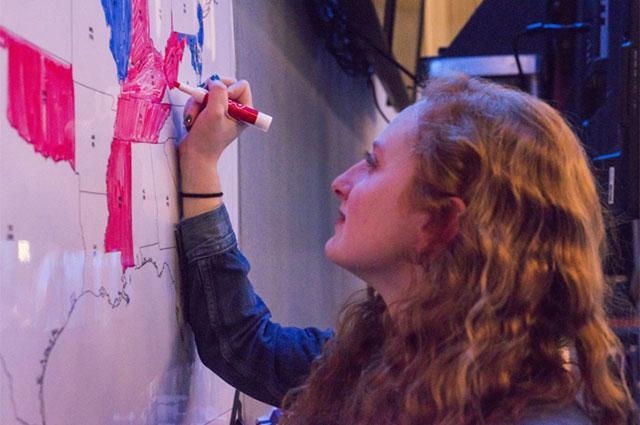ExCollege Explorations Course Examines Presidential Campaigns in Real-Time

Former ExCollege Board member and Tufts alumna, Sarah Newman (A18), pictured at the Election Night Extravaganza event for the 2016 presidential election on Nov. 8, 2016. Photo by Ray Bernoff.
Waisel, a senior studying Political Science, explained that he’s always been fascinated with U.S. elections and has studied them at all levels of American politics. After serving as a teaching assistant for two years in the Tufts Pre-College International Relations program for high school juniors and seniors, Waisel sought additional opportunities to connect with students about election-related topics. Teaching his own Explorations course was the perfect next step. He took a first-year advising seminar when he arrived at Tufts and recalled, “I had amazing senior mentors teaching that class, so I thought teaching and acting as a mentor would be a way to give back.”
Although Waisel considered teaching a course about all levels of American elections, he ultimately decided to narrow the focus to presidential elections. We were, after all, entering the heart of a tense general election cycle when the fall semester began! He structured the course so there has been a parallel analysis of current campaign methods with presidential campaigns throughout history. The goal was to help students develop a strong background in campaign history by November 3rd.
“The actual teaching of the class is rather similar to what I have experienced in other ExCollege classes—lots of discussion, collaborative group work, writing, and presentations. The main reason this class is unique is that it is happening during the 2020 presidential election... Being able to see the campaign play out in real time will be beneficial in many ways — most importantly, it gives us a chance to apply some of the historical lessons to what is certainly an unconventional election year.”
Conversations thus far have centered on several key topics and questions such as, what characterizes a winning or losing campaign? How do campaign contributions, advertisements, and voter engagement influence the election? What about current events, new allegations, and evolving sociopolitical factors?
Students are expected to keep up with readings and some podcasts. There have been regular, short response papers throughout the semester to align with class content. Waisel also included two debates in his syllabus. The first occurred in week four, when they were exploring characteristics of successful voter turnout operations. The critical question for debate: which is more crucial to a presidential campaign’s voter turnout operation, a strong ground game or a strong digital presence? The second debate will take place in week eleven; students will examine the results of the election and discuss why either side won or lost. To wrap up the course, groups of three will choose a specific law or amendment relating to presidential elections and formulate a multimedia presentation on how that legislation has influenced campaign strategy over time.
Elena Axinn, a first-year student in the course shares, “Discussing what goes on during a presidential campaign in a classroom setting has been my highlight of this 2020 election cycle. It’s great to come together with a group of relatively like-minded teenagers and hash out all of the political complexities of the semester.”
Waisel expressed that he’s been “so lucky to have students who are so engaged and want to participate,” which has made teaching especially rewarding this semester. However, one unpredictable factor is the actual election results, which may influence the trajectory of the course going forward. After the election tomorrow Waisel plans to take the information they’ve learned and look forward to the 2022 and 2024 elections, but that may quickly change if — as some reports have speculated — the election results are unclear for some time or litigated in the courts. He notes:
“On election night, I've encouraged everyone to participate in the activities that Tufts is hosting. We will follow that up with our usual class on Wednesday evening…. If results are in doubt, or if vote counts are cut short before every vote can be counted, then I will certainly have to alter our plans for the following weeks. In that case, we will take it week-by-week and use whatever craziness that occurs as an opportunity to learn.”
Like everyone else in the country and around the world, Waisel and his students will have to wait and see. In the meantime, he explains:
“If my students take one thing away from the course, I hope they gain a better understanding of how the longstanding structures of American government play such an important role today. As well, I want them to understand that these structures can be changed—but, it will require mass mobilization.”
Election Day resources can be found at Tufts Votes 2020.
Written by Grace Prendergast, Class of 2023
Published November 2, 2020